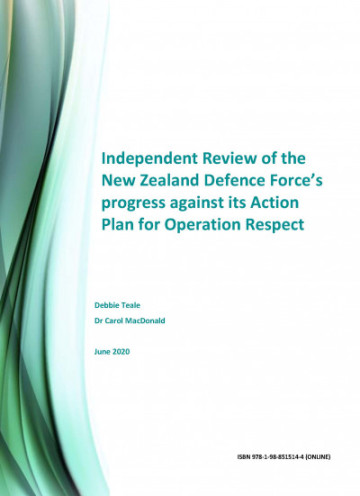
Published: 16 Jul 2020
Category: Publication
This independent review examines the New Zealand Defence Force’s (NZDF) efforts on creating a culture of dignity and respect by assessing NZDF’s progress on the Action Plan for Operation Respect.
Download PDF 1.3 MBAdditional info
Additional info
In 2016, the Chief of Defence Force at the time launched the Operation Respect programme in order to eliminate harmful behaviour in the NZDF. Three years later it was considered timely to assess the progress against the Action Plan for Operation Respect. NZDF senior leadership also expressed a strong interest in gaining an independent perspective on progress and whether NZDF is well-placed to achieve the objectives of Operation Respect.
To conduct the review the Ministry of Defence commissioned independent reviewers with the relevant subject matter expertise to provide an independent view and analysis of NZDF’s progress.
The independent review assesses NZDF’s progress against the key objectives of the Operation Respect Action Plan which are:
- establish a strategy to change NZDF’s culture;
- increase training and education;
- provide an alternative way to report sexual assault;
- create dedicated, professional sexual assault response team;
- address specific risk factors associated with facilities and alcohol;
- recruit more women into the armed forces, and increase female representation in senior leadership roles; and
- monitor and further reduce discrimination, harassment and bullying.
Overall, the reviewers found that some progress is being made. The review notes the standing up of Operation Respect to foster a culture of respect is a success in itself. Other successes of Operation Respect include:
- the establishment of the Sexual Assault Response Team and Sexual Assault Prevention Response Advisors;
- the provision of Sexual Ethics and Responsible Relationships training;
- the creation of the Operation Respect Steering Group with members external to the NZDF; and
- the buy-in from many great leaders across the organisation who are committed to making a difference but who need more tools and resources to achieve their objectives.
However, the review also found significant barriers to progress. The final report notes four fundamental challenges impeding NZDF’s success in realising the Action Plan:
- a lack of transparency and accountability of NZDF’s progress in addressing and preventing harm;
- the current culture still encourages a ‘code of silence’;
- the culture of military discipline and command prevents personnel from raising concerns of speaking out; and
- the culture also makes it is difficult to call out behaviours or decisions made by personnel more senior in the hierarchy.
Based on their findings, the reviewers made 44 recommendations. The recommendations include: request that the Auditor-General carries out an audit every two years of NZDF’s progress; consider the steps towards establishing a Defence Ombudsman to receive and process complaints; and create an integrated data management system to collect data and report on complaints and outcomes of incidents.
© Crown Copyright
This copyright work is licensed under the Creative Commons Attribution 4.0 International licence. In essence, you are free to copy, distribute and adapt the work, as long as you attribute the work to the Ministry of Defence and abide by the other licence terms.
